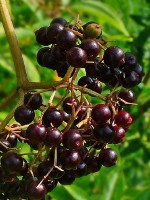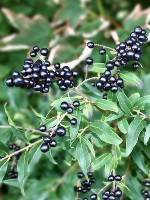Mon-Fri 9am - 5pm Mountain time
Ranch Elderberry vs Wild Privet
Sambucus canadensis Ranch
Ligustrum vulgare
NOT AVAILABLE THIS SEASON - MIGHT RETURN
NOT AVAILABLE THIS SEASON - MIGHT RETURN
Ranch Elderberry is a vigorous and high-yielding Black Elderberry cultivar. It ripens earlier than other varieties and is smaller and more compact making berry harvest easier. The berries are well-suited for baked goods, jams, jellies, and syrups. They are high in vitamin C and reported to be beneficial for the immune system.
Black Elderberries are considered to be partially self-pollinating. So while they will still produce some berries without cross-pollination, planting with another variety will increase yields. Consider planting with Black Elderberry or Bob Gordon Elderberry.
Warning: the seeds, stems, leaves, roots, and uncooked berries are toxic to humans when eaten in quantity. Berries should be cooked to make them safe for human consumption.
Wild Privet is a fast growing ornamental shrub that is well suited for forming hedges and privacy screens. It will retain its leaves in warmer climates but drops them in colder areas. They have small white flowers, though the smell is often considered unpleasant. While the berries are inedible, they are a good food source for many bird species.
It is recommended to prune Wild Privet immediately after flowering, as it can readily self seed. It is deer and rabbit tolerant. It can grow in dry areas, on slopes, and withstand the wind making it well suited for many growing conditions.
Ranch Elderberry Quick Facts
Wild Privet Quick Facts
Toxicity: leaves, stems, and uncooked berries are poisonous to humans
Toxicity: If ingested, all parts of this plant will cause severe discomfort. Toxic to dogs, cats, and horses

